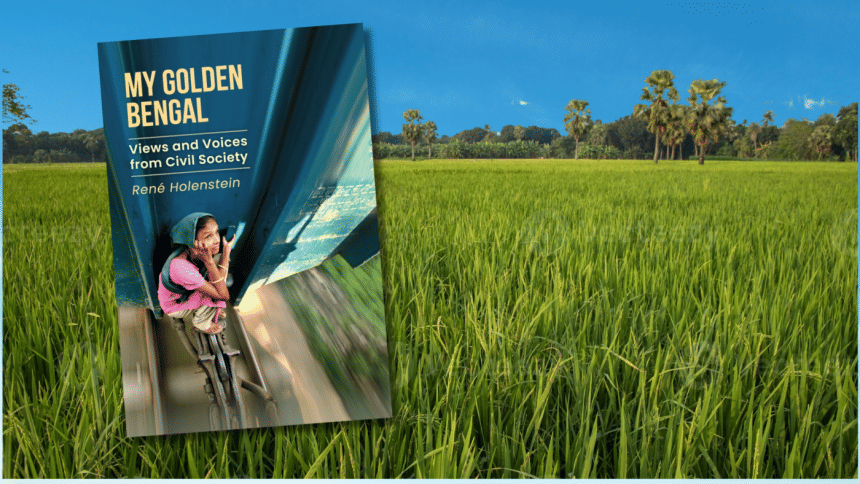A review of My Golden Bengal: A serious book for serious times

A remarkable gathering of informants have been interviewed in recent years by René Holenstein, a former ambassador for Switzerland, who returned to Bangladesh in May 2024 to launch this book in the company of most of them. It is a testimony to his period in office here that he explored the country with affection and detail, and listened well to people in the villages as well as leading figures representing concerned academics and lawyers, and activists from many parts of the civil society. As a collection of their testimonies, My Golden Bengal: Views and Voices from Civil Society (published by UPL) combines recollections from the liberation struggle which outline the hopes for a distinctive national mission reflecting Bangalee socio-cultural traditions in contrast to those of the dominant, oppressing partner in the flawed postcolonial experiment that was Pakistan. It is never a bad idea to be reminded of the trauma of that struggle, especially in its final episode of crackdown. It took the lives of Bangladeshis to atone for the catastrophic mistake of a rushed exit via Partition.
With this backdrop, ambivalence is soon displayed in this volume. A sense of disappointment that the hopes and dreams of a generation quickly descended into contestation as desperate people and groups fought for their family livelihoods by whatever means possible in the knowledge that the young state was unable to come to their rescue. Perhaps the legacy of chaos left by departing forces from Pakistan and then India could have been highlighted more as the context within which inexperienced leaders wrestled for control and stability. While struggles against a common enemy can unite, things can also rapidly fall apart. And it is often observed that campaigning and voice is not always the best qualification for governing.
The author has to manage this balance between recording the views of his interlocutors and providing his own interspersed analysis that respects those accounts rather than challenging or re-interpreting them. This is what makes the book unique in a sense, because it is not a single author's account in effect. The "data" is presented in its raw form and then has to be woven into a narrative. It is a navigation between a range of views and voices, to use the book's subtitle.
These views progress to the present, reflecting on the challenges now evident in society. Of course, there is a consensus that the violent coup in August 1975 was a betrayal of all that had been fought for, no matter that it occurred within a sense of letdown. And a further consensus of no sympathy for the period of military rule which followed up to the end of 1990, 15 years later. By this route, most of the interlocutors reach the similar point of a country faced with a prospect of unfinished dreams under the conditions of a tarnished democracy. A familiar set of criticisms emerge of hopes dashed. These amount to the imperative for a continuous need for struggle to realise ambitions, originally promised. The common theme emerges as vigilance across all sectors of Bangladeshi life, whether it is the persistence of child marriage, widespread rent-seeking and corruption enabling the megarich, the absence of openly competitive politics and voting, the pervasiveness of violence both as a means of that competition and as perpetrated upon women, freedom of speech, shrinking of space for civil society to exercise its accountability role, or free riders escaping civic duty to pay taxes—and the list goes on, as frequently covered by this newspaper.
But the need for vigilance is not the only theme. The question of glass half full or half empty emerges. Achievements are observed. Not least from outside the state, from among the NGOs and from among business. One of the interlocutors offers the sobering thought that it could have been much worse. This comment sets up the development/democracy discussion towards the end of the book, akin perhaps to the paradox debate. This is a sharp reminder that many societies globally have historically developed with deeply flawed governance systems—not least the UK during the 19th century. And of course, some still do, as in China with its autocratic development model. With his development background, it would have been interesting if the author could have coaxed a little more in this regard from his impressive list of interlocutors. It would have certainly connected Bangladesh to the literature on the developmental state. And perhaps a sharper conclusion could then have been offered referring to another literature about lost opportunities when governance in both senses of accountability and competence falls short of the needs of development, and the correlation between rising inequalities and dangers to the body politic, which renders "leave no one behind" as a hollow joke.
These missing parts leave one with a sense of widespread collusion in the "good enough governance" position, which delivers some development through cascading paths of patronage, rather than as a matter of citizen rights and entitlements, just keeping the society on the right side of fragile stability. But such collusion does not come from most interlocutors, but rather from a wider set of global observers. The participants in this book can be distinguished by the feeling that their collective job has not yet been done. And the author has allowed this sentiment to be expressed. But perhaps uncomfortably, this leaves us with the hanging question—should this responsibility be passed down the generations to youth, or should the seniors remain on the barricades having both less to lose and less to gain personally? A final altruistic gift, albeit risky, to the future of that youth.
This book should be read widely, and it would certainly enhance its value to society if it appeared in Bangla, not just German followed by English. A serious book for serious times, but also intensely readable.
Dr Geof Wood is a development anthropologist and author of several books and numerous journal articles, with a regional focus on South Asia. He is also emeritus professor of international development at the University of Bath, UK.
Views expressed in this article are the author's own.
Follow The Daily Star Opinion on Facebook for the latest opinions, commentaries and analyses by experts and professionals. To contribute your article or letter to The Daily Star Opinion, see our guidelines for submission.

 For all latest news, follow The Daily Star's Google News channel.
For all latest news, follow The Daily Star's Google News channel. 





Comments